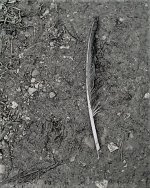Heron Haunting


By markle
- 1341 reads
Mist on water always makes me feel pursued. Crossing Iffley Meadows during a chill sunset, I never stop glancing toward the river, where silvery exhalations hang over the reflections of light on Donnington Bridge. The late return, when it’s even colder, and monochrome creeps along the uncut grass, is bleaker. The mist pushes over the grass, daring me into its envelopment.
Of course, there’s a touch of MR James about this, a knowingness that all this is willed – and yet still uncanny. In river mist the sound of steps magnifies so much that I expect the sudden pinch of a hand on my arm, the rank breath of something on my face.
Nights as cold as that are less common now. Most often it’s just damp and dark. Still, hauntings are possible. I encountered one as I walked Abingdon Road one early evening in thin rain. The buses loomed and passed me, followed by the click of cyclists changing gears. Light filled the road, spilling into the sports fields on the east side. The sky too had its reddish stains. But the grass in the field by the Eastwyke Ditch was in shadow, shielded by the bridge wall and the bankside willows. “S” was written twice down there, in orange white. Two herons: “s” for “stillness”, for “stalking”.
I like herons. I stop and watch them whenever I can beside Oxford’s waterbodies, and in open fields where voles and invertebrates might show themselves. Their patience, the perfection of their stance as they wait, holds me. How would it be to have those eyes and their gaze along that sabre beak.
Field voles, a common prey item, are bundles of sensory alertness, for food and for predators. Their noses, ears and whiskers familiarise them with every aspect of their surroundings. It is as impossible to feel as a vole feels as it is to understand immobility as a heron does. A heron’s stillness, its immersion in the wet and grass means that its presence becomes only a whisper of suspicion: a streak of white glimpsed overhead, a whiff from the bird’s previous meal on the fringes of awareness.
That dismal evening, rather than admire the herons, I found myself imagining the vole’s perspective.
The birds gleamed in the light from the road, all feathers, beaks and legs the same soaked-out orange. Once in a while one or other would take a step, slower than felt comfortable to me, and position itself again. The long toes were individually visible. The beak, in profile, lowered gently until it and the eyes were at the prime angle.
Then one struck, faster than my eye could read. The head cranked back and the prey was a bulge in the illuminated throat. The heron shook its head a few times and returned to stillness.
The jolt from immobility to death had something of the slasher film about it. Field voles are more common in the UK even than humans, so it was inevitable that one, or another small rodent, would drop its guard and run by the heron’s watch. A single mistake in the dark, and the blade came down.
I looked down over the herons for a few more minutes, but they did not move at all. They might as well have been that double “S” as I first read them. But they were still poised to strike, haunting the vole ways in the grass. It was an idea to shiver with as I turned to go on under the streetlights along the familiar road.
First published in "Oxford Magazine"
- Log in to post comments
Comments
I ddin't realise field voles
I ddin't realise field voles were so much more abundant than the scarce water voles. Quite a privilege to be able to watch the herons hunting - mists, and artificial light on rain can make everything seem to have a haunting touch! I liked the description of the bird's slow step, could almost 'see' the movement. Rhiannon
- Log in to post comments
a great piece of nature
a great piece of nature writing - thank you!
- Log in to post comments
BEAUTIFUL, the first
BEAUTIFUL, the first paragraph drew me right in, but there were gorgeous phrases all through. And I didn't know about herons eating voles. We have them here but have only seen them hunt at night, on the beach in pools of street light, as the seagulls and rooks go for them in daylight. They have the most heartbreakng call, don't they?
- Log in to post comments


